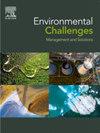Exploring awareness of planetary health and antibiotic disposal advice across Australian Pharmacies: A mystery shopping expedition
Q2 Environmental Science
引用次数: 0
Abstract
Background information
Inappropriate disposal of unused antimicrobials can push the environment out of balance, and increase the likelihood of antimicrobial-resistant organisms to grow. We aimed to investigate the recommendations for the disposal of unwanted antibiotics given as advice to consumers by community pharmacists practising in Australia.
Methods
A cross-sectional study using mystery shopping explored pharmacists' recommendations for disposing of unwanted antibiotics. Simulated patients called community pharmacies across Australia for advice on disposing of leftover antibiotic mixtures.
Findings
Of 1577 pharmacists called across Australia, over 59 % recommended incorrect disposal methods, i.e., putting the leftover antibiotic syrup in the home rubbish bin or down the sink or toilet, 28.4 % recommended putting the unused antibiotic straight into the rubbish bin, and 10 pharmacists recommended throwing the leftover syrup on the grass, soil, or in a street drain. There were 19 pharmacists who did not want to recommend disposal at all; some recommended calling the prescriber to ask. Of the pharmacists who advised consumers to return unwanted antibiotic liquid to their pharmacy, 21 (1.3 % overall) indicated that they would pour it down the sink at the pharmacy upon being returned.
Interpretation
Pharmacists' advice on antibiotic disposal varied despite the availability of a national scheme enabling consumers to return unwanted medicines to pharmacies for this purpose. Enhanced education and policies could help pharmacists guide the public on proper disposal.
探索澳大利亚药店对地球健康和抗生素处理建议的认识:神秘购物考察
背景信息不适当地处理未使用的抗菌药物会使环境失去平衡,增加耐抗菌生物生长的可能性。我们的目的是调查在澳大利亚执业的社区药剂师向消费者提出的处理不需要的抗生素的建议。方法一项采用神秘购物的横断面研究探讨了药剂师对处理不需要的抗生素的建议。研究结果在全澳大利亚接到电话的1577名药剂师中,超过59%的药剂师建议了错误的处理方法,即把用剩的抗生素糖浆放进家里的垃圾桶或水槽或马桶里,28.4%的药剂师建议把没用完的抗生素直接放进垃圾桶,10名药剂师建议把用剩的糖浆扔到草地、泥土或街道下水道里。有 19 位药剂师完全不想建议如何处理;有些药剂师建议打电话给处方医生询问。在建议消费者将不需要的抗生素药液送回药房的药剂师中,有 21 人(占总人数的 1.3%)表示,他们会在消费者将药液送回药房后将其倒入药房的水槽中。加强教育和政策可以帮助药剂师指导公众正确处理抗生素。
本文章由计算机程序翻译,如有差异,请以英文原文为准。
求助全文
约1分钟内获得全文
求助全文
来源期刊

Environmental Challenges
Environmental Science-Environmental Engineering
CiteScore
8.00
自引率
0.00%
发文量
249
审稿时长
8 weeks
 求助内容:
求助内容: 应助结果提醒方式:
应助结果提醒方式:


